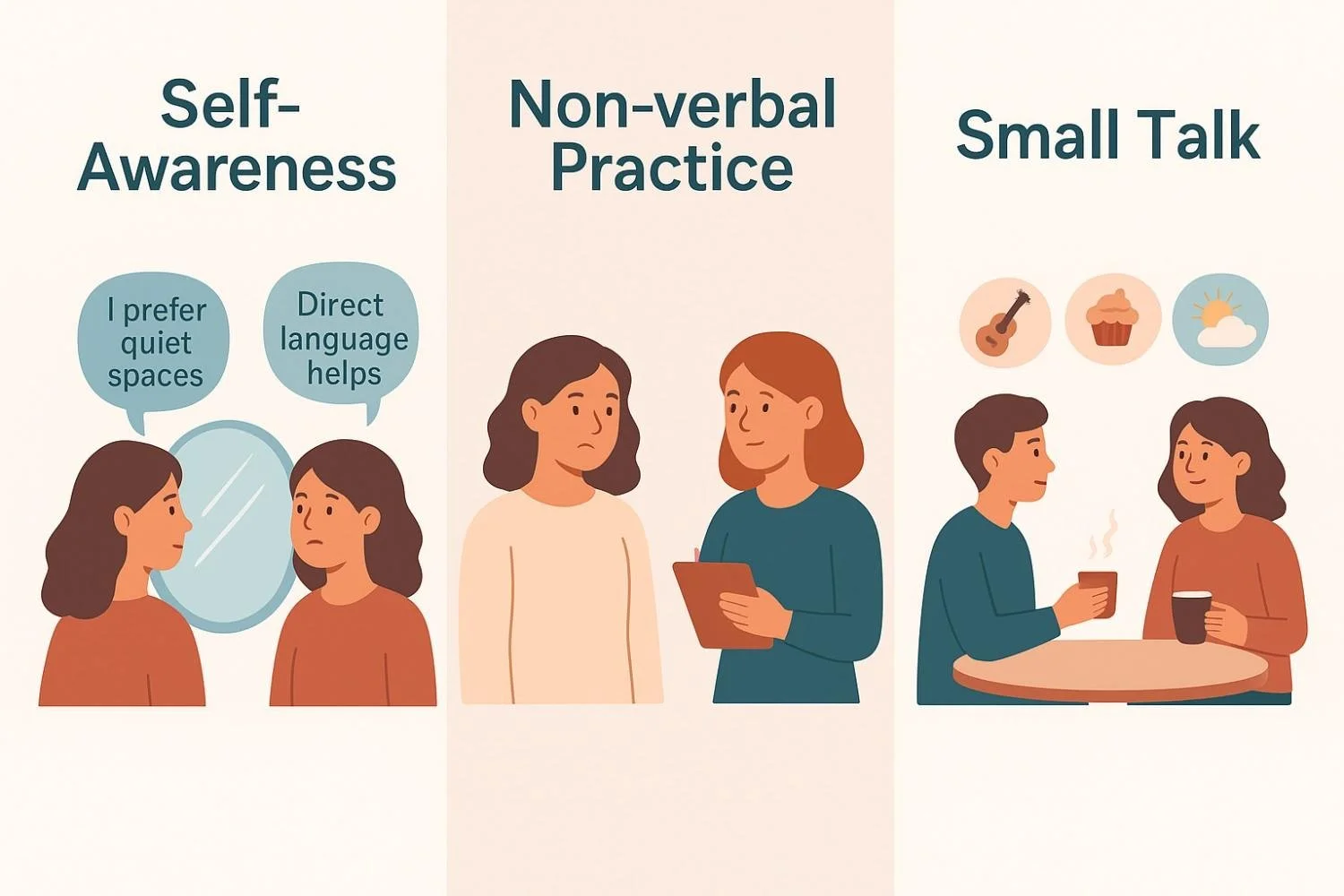How to Improve Communication As a Neurodivergent Adult
Communication is an integral part of daily life, from conversations with family members to interactions in society. For many neurodivergent adults and teens, communication can feel different from what it does for neurotypical people.
These differences are not shortcomings. They are unique styles of human interaction that deserve recognition and respect.
At the same time, some autistic people and other neurodivergent individuals may want to strengthen certain communication skills to build confidence and feel more comfortable in social situations.
Key Takeaways
Neurodivergent adults and teens bring unique communication styles that deserve recognition and respect. Building self-awareness and identifying personal communication preferences can support confidence in conversations.
Strategies such as using direct language, being aware of body language, or practicing small talk can help make social interactions feel more comfortable and less stressful.
Speech therapy provides a supportive environment for autistic adults, teens, and other neurodivergent individuals to develop communication skills in ways that align with their goals and personal style.
Communication Skills and Styles in Neurodivergent Teens and Adults
Strategies to Improve Communication Skills in Social Situations
Improve Communication Through Social Skills Practice
Building Confidence in Relationships
Frequently Asked Questions About Improving Communication As a Neurodivergent Adult
How Connected Speech Pathology Can Help a Neurodivergent Person
Communication Skills and Styles in Neurodivergent Teens and Adults
Communication involves much more than talking. It includes non-verbal communication, tone of voice, and awareness of social cues. For neurodivergent individuals, communication styles may differ from those expected in the neurotypical world.
Autism spectrum disorder (ASD), often referred to simply as autism, describes a wide range of communication styles and social experiences.
Autistic communication often values clarity and direct language, which can sometimes be misunderstood by neurotypical individuals who expect small talk or indirect phrasing. Autistic women in particular may face pressure to hide their natural communication style, which can lead to stress or low self-esteem. Recognizing and valuing these differences is the first step toward better communication.
Each neurodivergent person brings strengths to conversations. Some thrive in detailed discussions about special interests. Others communicate more comfortably through non-verbal communication or creative expression. Building self-awareness and self-understanding helps you identify which communication preferences feel most natural to you.
Try This Reflective Neurodivergent Quiz
Wondering if you’re neurodivergent? Try our quiz!
Strategies to Improve Communication Skills in Social Situations
Focus on Self-Awareness and Communication Preferences
Self-awareness means noticing how you communicate and how others respond. Many neurodivergent adults find that identifying their communication preferences makes interactions easier and more effective. For example, you may feel more comfortable in quiet spaces or in conversations where others use direct language.
Writing down what feels challenging can highlight patterns. You may find that social cues, such as facial expressions or eye contact, seem unclear. Once you identify these challenges, you can practice strategies that make communication more effective and less stressful.
Practice Reading Body Language and Non-verbal Communication
Body language and nonverbal cues often play a role in how people share feelings and intentions. Gestures, tone of voice, and facial expressions can sometimes feel unclear or overwhelming for autistic people and other neurodivergent individuals. At the same time, autistic communication often shines in its clarity, honesty, and direct language, which many people deeply value.
Learning about non-verbal signals at your own pace and in ways that feel comfortable can add tools for moments when they are helpful. Practicing with trusted family members or friends, such as asking them to display different emotions through expressions or gestures, can provide a safe way to notice patterns without feeling pressured.
This process is not about changing your natural style but about building confidence and options for smoother social interactions when you choose to use them.
Build Confidence with Small Talk and Conversations
Small talk may feel repetitive or confusing for autistic people and other neurodivergent individuals. While it may not always feel meaningful, it can sometimes open the door to stronger connections and shared experiences. Practicing small talk on familiar topics such as hobbies, food, or the weather can help you feel more comfortable in casual conversations when you choose to engage in them.
You can practice with supportive family members or friends who respect your style. Preparing simple phrases ahead of time can also make it easier to begin a conversation without added stress. For many people, this practice helps reduce anxiety and makes everyday interactions feel smoother.
Improve Communication Through Social Skills Practice
Social skills are learned, not fixed, and you can build them in ways that suit your preferences. Autistic people and other neurodivergent individuals may benefit from structured opportunities to practice conversations, turn-taking, or group interaction. These skills are not about changing who you are. They are tools you can choose to use to feel more confident in different social settings.
Social skills speech therapy can provide a safe and supportive environment for this practice. With guidance, you can focus on the skills that matter most to you and strengthen the connections that are most meaningful in your personal, academic, and professional life.
Building Confidence in Relationships
Relationships can feel different for neurodivergent people, especially in a world shaped by neurotypical communication styles. Family members, friends, teachers, coworkers, and dating partners may sometimes misinterpret autistic communication or other unique communication styles. Building confidence in these areas starts with knowing your own communication preferences and expressing them openly.
In family life, confidence grows when you share your needs directly. For example, you might explain that eye contact feels uncomfortable, or that you prefer clear instructions over vague suggestions. These conversations set expectations and reduce stress in daily interactions.
Friendships thrive when there is space for different communication styles. Autistic teens and adults often form strong connections through shared special interests, gaming, or structured activities. Being upfront about what makes conversations easier helps friends better understand and support you.
Dating and romantic relationships bring their own challenges and opportunities. Teens and adults on the autism spectrum may feel uncertain about social cues, flirting, or small talk. Practicing with a trusted person, role-playing common scenarios, or setting clear boundaries can make dating less stressful. Many partners appreciate honesty and direct language, which can strengthen trust and reduce misunderstandings.
In the workplace, effective communication can feel challenging, but self-awareness and regular practice can help. Preparing talking points before meetings, requesting written follow-ups, or clearly sharing your communication preferences can strengthen professional relationships. Over time, these strategies foster stronger connections and more meaningful interactions in all areas of life.
Frequently Asked Questions About Improving Communication As a Neurodivergent Adult
1. How can autistic adults modify their communication skills?
An autistic person can strengthen their communication by using strategies that match their natural style, such as direct language, practicing conversations in safe settings, or role-playing with trusted people. Social skills speech therapy can provide support through practicing small talk, building confidence with body language if desired, and focusing on skills that feel meaningful. Over time, many autistic individuals find ways to connect that feel both comfortable and authentic.
2. What are common communication challenges for neurodivergent people?
Neurodivergent individuals may experience challenges with maintaining eye contact, interpreting facial expressions, or engaging in small talk. Indirect language can feel confusing, and neurotypical people may misunderstand a preference for non-verbal communication. Recognizing these differences allows for strategies that reduce stress and make social interactions more comfortable.
3. Can non-verbal communication support neurodivergent adults?
Yes. Non-verbal communication, such as gestures, tone of voice, and facial expressions, can provide additional context in conversations. Some neurodivergent individuals also utilize alternative communication methods, such as written text, which provide flexible and effective ways to share thoughts and feelings. These approaches add options for self-expression without replacing a person’s natural style.
4. How does speech therapy help autistic communication?
Speech therapy and communication coaching support autistic adults and other neurodivergent individuals by highlighting strengths while addressing areas that feel challenging. A speech therapist may work on conversational practice, self-advocacy, or interpreting nonverbal cues when appropriate. They can also suggest tools and strategies that make everyday communication easier while respecting personal preferences.
5. Why is direct language valuable for autistic people?
Direct language is valuable for autistic people because it reduces confusion and makes conversations clearer. Straightforward communication supports better understanding between neurodivergent and neurotypical individuals. Many people also appreciate the honesty and clarity that neurodivergent people may use, which helps build stronger relationships in daily life.
6. How can neurodivergent teens and adults build confidence in friendships and dating?
Neurodivergent teens and adults may face unique challenges in friendships and dating, such as interpreting social cues or knowing how to start conversations. Practicing with trusted family members, friends, or a speech therapist can make these situations feel less stressful.
Many teens also find that focusing on shared interests, being upfront about their communication preferences, and using direct language helps build stronger and more supportive relationships.
How Connected Speech Pathology Can Help a Neurodivergent Person
Connected Speech Pathology offers online speech therapy for autistic teens, autistic adults, and other neurodivergent individuals seeking support with communication. Our speech-language pathologists create strategies that respect your unique communication style and align with your personal goals. Sessions may focus on practicing conversations, building confidence in social skills, or exploring approaches that make daily interactions feel more manageable.
Online speech therapy makes support accessible from anywhere. Every plan is designed to help you grow in communication while honoring your preferences and strengths. With the proper support, you can build stronger connections in relationships, at school, at work, and in every part of life that matters most to you.
Summary
Improving communication as a neurodivergent teen or adult begins with honoring your unique communication style. Strategies such as practicing small talk, being aware of body language, and selecting communication tools that suit your needs can make daily interactions feel more comfortable.
With the right support, many people gain confidence and build stronger connections in their relationships, at school, at work, and in their community life. Communication is not about changing who you are. It’s about finding approaches that highlight your strengths and help you connect with others in ways that feel true to you.
About the Author
Allison Geller is a communication coach, speech-language pathologist, and founder of Connected Speech Pathology, an international online practice providing professional communication coaching and speech therapy for children, teens, and adults. With more than two decades of experience, she has worked in medical and educational settings, published research on aphasia, and leads a team of specialists helping clients improve skills in public speaking, vocal presence, accent clarity, articulation, language, fluency, and interpersonal communication.









